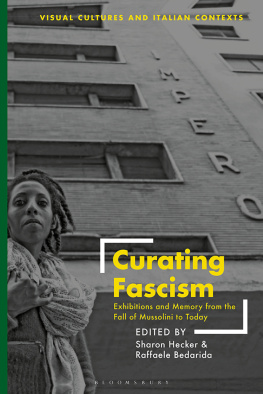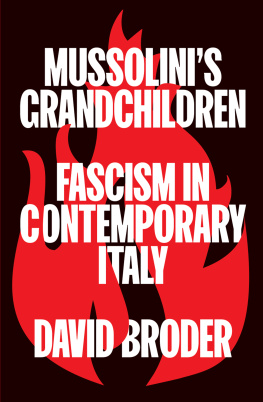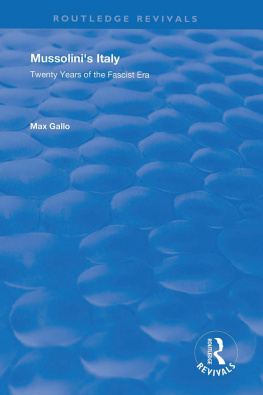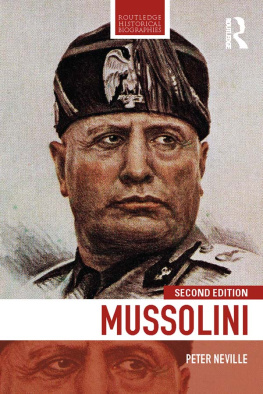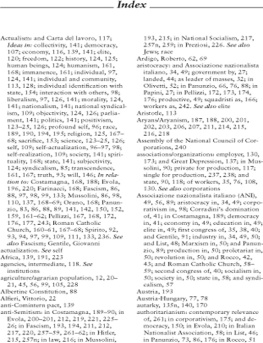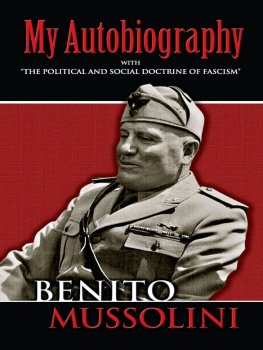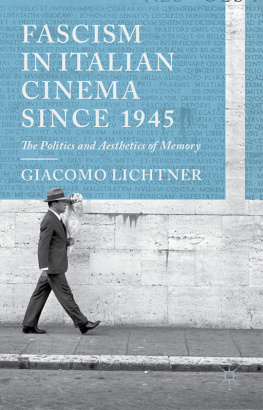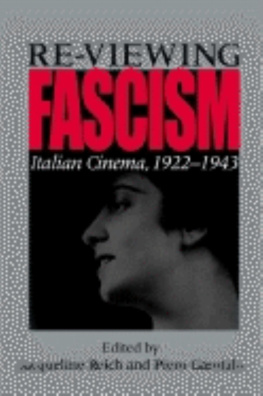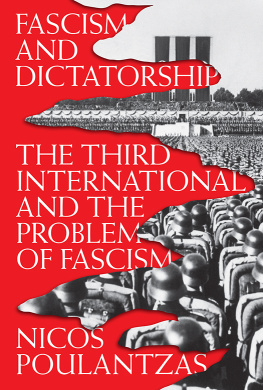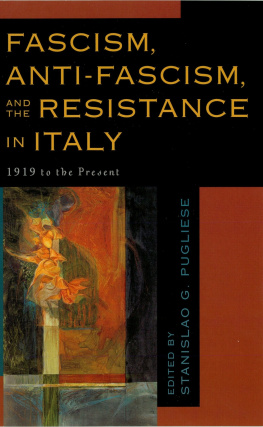Curating Fascism
Visual Cultures and Italian Contexts
Series Editor
Dr. Sharon Hecker, Independent Art Historian
Visual Cultures and Italian Contexts publishes innovative research into visual culture in modernist Italy, as well as in diasporic linguistic and cultural communities beyond this particular geographic, historic, and political boundary. The series invites cutting-edge scholarship by academics, curators, architects, artists, and designers across all media forms; it engages with traditional methods in visual culture analysis, as well as inventive interdisciplinary approaches, and seeks to encourage a dialogue amongst scholars in core disciplines with those pursuing innovative interdisciplinary and intermedial research.
Advisory Board
Romy Golan, The Graduate Center, New York, USA
Ara Merjian, New York University, USA
Paolo Scrivano, Politecnico di Milano, Italy
Arianna Arisi Rota, Universit di Pavia, Italy
Elena Dellapiana, Politecnico di Torino, Italy
Rosetta Caponetto, Auburn University, USA
Noa Steimatsky, Film Historian, USA
Lucia Re, UCLA, USA
Proposals for monographs, edited volumes, and outstanding scholarly studies by established as well as emerging writers from a wide range of comparative, theoretical, and methodological perspectives are welcome, especially those on colonialism, race, sexuality, gender, politics, and material history in twentieth- and twenty-first-century contexts.
Titles in the Series
Marisa Mori and the Futurists: Italian Breasts in the Sun and Beyond, by Jennifer S. Griffiths (forthcoming)
Curating Fascism
Exhibitions and Memory from the Fall of Mussolini to Today
Edited by
Sharon Hecker and Raffaele Bedarida

The editors dedicate this volume to family members who experienced fascist persecutions:
Piroska, Imre (Amerigo), Erzsi and Laci Katz and the Calabi and Ancona families Pia, Guido, Anna, Gabriele, and David Bedarida; Lea and Gastone Orefice

Contents
The Editors
Sharon Hecker (B.A. Yale University cum laude, M.A. and Ph.D. University of California at Berkeley) is an art historian and curator specializing in modern and contemporary Italian art. She is a leading authority on Medardo Rosso and has published extensively on key twentieth-century Italian artists, including Lucio Fontana, Luciano Fabro, Marisa Merz, Giuseppe Penone, and Francesco Lo Savio. Her books include A Moments Monument: Medardo Rosso and the International Origins of Modern Sculpture (University of California Press, 2017, awarded the Millard Meiss Publication Fund from the College Art Association); Postwar Italian Art History: Untying the Knot (co-edited with Marin R. Sullivan, Bloomsbury, 2018); Lead in Modern and Contemporary Art (co-edited with Silvia Bottinelli, Bloomsbury, 2020); Finding Lost Wax: The Disappearance and Recovery of an Ancient Casting Technique and the Experiments of Medardo Rosso (Brill, 2020), Posthumous Art, the Market and Art Law (co-edited with Peter J. Karol, Routledge, 2022). Hecker has received fellowships from the Getty, Fulbright, and Mellon Foundations. Her exhibitions include Medardo Rosso: Second Impressions, with Harry Cooper (Harvard University Art Museums, 2004); Medardo Rosso: Experiments in Light and Form, with Tamara H. Schenkenberg (201718); and Medardo Rosso: Sight Unseen, with Julia Peyton-Jones DBE (2018). She is organizing an exhibition on Lucio Fontanas ceramics at the Peggy Guggenheim Collection, Venice (2025).
Raffaele Bedarida is Associate Professor of Art History at Cooper Union, New York where he coordinates the History and Theory of Art program. An art historian and curator specializing in twentieth-century Italian art and politics, Bedarida focuses on cultural diplomacy, migration, and cultural exchange between Italy and the United States. He is the author of three monographs, Bepi Romagnoni: Il Nuovo Racconto (Silvana Editoriale, 2005), Corrado Cagli: La pittura, lesilio, LAmerica (Donzelli, 2018, English edition upcoming) and Exhibiting Italian Art in the United States: Futurism to Arte Povera. Like a Giant Screen (Routledge, 2022). He has published extensively in periodicals and edited volumes, including The International Yearbook of Futurism Studies, Oxford Art Journal, Tate Moderns In Focus, and Artforum. For his work on the exchange between Italy and the United States, Bedarida has received fellowships from the Center for Italian Modern Art (CIMA) and the Terra Foundation for American Art. He currently serves as a member of the Advisory Committee of the Massimo Campigli Archives, the Archivio Crispolti Arte Contemporanea and as the co-chair of the European Postwar and Contemporary Art Forum.
The Contributors
Renato Barilli is Emeritus Professor at the University of Bologna, Italy. His research interests include aesthetic philosophy and literary and art criticism. He has curated several exhibitions of Italian art of the nineteenth and twentieth centuries. Among Barillis many books: Scienza della cultura e fenomenologia degli stili (1982, most-recent ed. 2007), Larte contemporanea (1984, most-recent ed. 2005), La neoavanguardia italiana (1995, most-recent ed. 2007), Lalba del contemporaneo (1995), Dal Boccaccio al Verga. La narrativa italiana in et moderna (2003), Maniera moderna e Manierismo (2004), Prima e dopo il 2000. La ricerca artistica 19702005 (2006), La narrativa europea in et moderna. Da Defoe a Tolstoj (2010), Autoritratto a stampa (2010), La narrativa europea in et contemporanea. Cechov, Joyce, Proust, Woolf, Musil (2014). He has published two art-historical survey books with the publisher Bollati Boringhieri: Storia dellarte contemporanea in Italia. Da Canova alle ultime tendenze (2007) and Arte e cultura materiale in Occidente (2011).
Gabriella Belli is Director of the Municipal Museums of Venice Foundation (Fondazione Musei Civici di Venezia). She was a Commissioner at the Venice Biennale in 1995. From 1982 to 2001, she worked on the construction of the collection of the Museo dArte di Trento e Rovereto (MART), inaugurated in 2002. She was Director of MART from 1990 to 2011. Under her direction, the restored home of Fortunato Depero opened as the Depero Futurist Art Museum in 2009. In 2011 she was appointed director of the Municipal Museums of Venice Foundation, a structure created to bring together the administration of several of the most important palace museums in Venice, including the Doges Palace, Ca Rezzonico, the Correr Museum, Ca Pesaro Museum, and others. In 2003, Belli was awarded the Premio internazionale Civilt Veneta (Venetian International Arts Prize). In 2011 she received from Guy Cogeval, on behalf of the French Cultural Ministry, a Knighthood of Arts and Literature and the ICOM Italy prize, when she was named as the best museologist of the year.
Emily Braun is Distinguished Professor of Twentieth-Century European and American Art History at Hunter College and the Graduate Center, CUNY, USA. Her research interests are interdisciplinary and include the interaction between political ideologies and visual representation; the construction of gender and otherness in art criticism; the history of exhibitions and collecting; Cubism and popular culture; and theories of viewer reception. She also writes on European art from 1945. Since 1987 Braun has curated the Leonard A. Lauder Collection of Cubist Art. She is the author of
Next page
